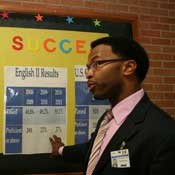Money isn't the only factor in a good education, but $5.2 million doesn't hurt, either.
After spending several years near the bottom of the district's rankings for No Child Left Behind, Wingfield High School jumped last year to about halfway up the list. Wingfield has a federal School Improvement Grant to allocate more than $5.2 million over the course of three years to improve students' academic achievement.
Will Smith, assistant principal for school improvement at Wingfield, said the money allowed the school to make drastic changes, and he has seen an improvement in student achievement. Within one year, the school's accountability status went up from at risk of failing to academic watch.
"After the first year of funding, Wingfield is no longer on that failing list," Smith said. "We're currently in year two, and we want to sustain what we've done."
Under the law, schools like Wingfield that do not meet student achievement goals for two years or more enter into a school-improvement plan. Depending on whether schools are able to make progress in the next few years, they might have to make dramatic changes to staff and academic programs.
At Wingfield, the school-improvement plan has meant replacing about half of the staff, providing weekend and after-school test preparation, providing professional development for teachers and extending the school day by 30 minutes to make time for more reading, among other changes.
Smith said the staff is creating a culture of learning at Wingfield that expects students to strive for higher grades and the school to one day be one of the state's star schools.
"It's possible," Smith said. "We're working very hard to get there."
If schools do not meet student achievement goals for two years or more, parents can also transfer their children to a higher-performing school, if they so choose. During the last school year, 10 Jackson Public Schools were in some phase of the NCLB school-improvement program.
Susan Womack, executive director of Parents for Public Schools of Greater Jackson, said she thinks people in Mississippi pay more attention to the state's ratings of schools--star schools, high performing and other labels--than to the federal labels NCLB established.
Although parents of students at schools that are restructuring can have their child transferred to a different school, many choose to keep their child at his or her old school. During the last school year, only 149 students transferred to different schools through the school-choice program.
"What we find is that even when parents are given a choice about changing schools, they often don't take advantage of it because their child may be doing OK in the school," Womack said.
JPS also received more than $4.8 million for Supplemental Educational Services, such as outside tutors for children in low-performing schools, through NCLB. More than 6,000 students were eligible for the program, but only about a third of them took advantage of the tutoring. During the summer, 537 students participated in the tutoring program.
'Tis the Season for Budgeting!
The school board has approved 10 priorities for setting the district's budget for the 2012-2013 school year. The priorities call for the district to look for external revenue sources while cutting costs.
The board is also looking for outside funding and community partners to help write a long-range financial plan to ensure its financial stability in the future.
Board member Otha Burton, who chaired the subcommittee that wrote the budget priorities, suggested that the next step should be establishing a formal budget committee and getting community input. Burton said given the tight budget JPS is likely to have next year, the school board will have some hard decisions.
"The real work begins now," he said. "... These are going to be tough."
JPS Budget Priorities, 2012-2013:
1. Minimum of 5 percent reduction in proposed 2012-2013 expenditures of the District Maintenance Fund from the approved 2011-2012 budget.
2. Maintain required student-teacher ratio within the district.
3. Maximize reduction in staff and administrative personnel where possible through attrition, retirements and separation.
4. Identify and explore additional external revenue sources for the District Maintenance Fund.
5. Stronger oversight and accountability of federal programs and financial management.
6. Explore outsourcing opportunities that will lead to favorable cost savings district-wide.
7. Closely monitor required reduction in expenditures versus unforeseen external demands for special programs, transportation and athletics, and validate any additional request and obtain board approval to reallocate resources as required.
8. Dedicate 20 percent of new external funds generated to District Maintenance Fund for facility upkeep.
9. Increase District Maintenance Fund balance by $2 million.
10. Identify external funding and partners to assist the district with undertaking a long-range financial plan, a reorganization/right-sizing assessment and a personnel salary study.



Comments
Use the comment form below to begin a discussion about this content.
comments powered by Disqus